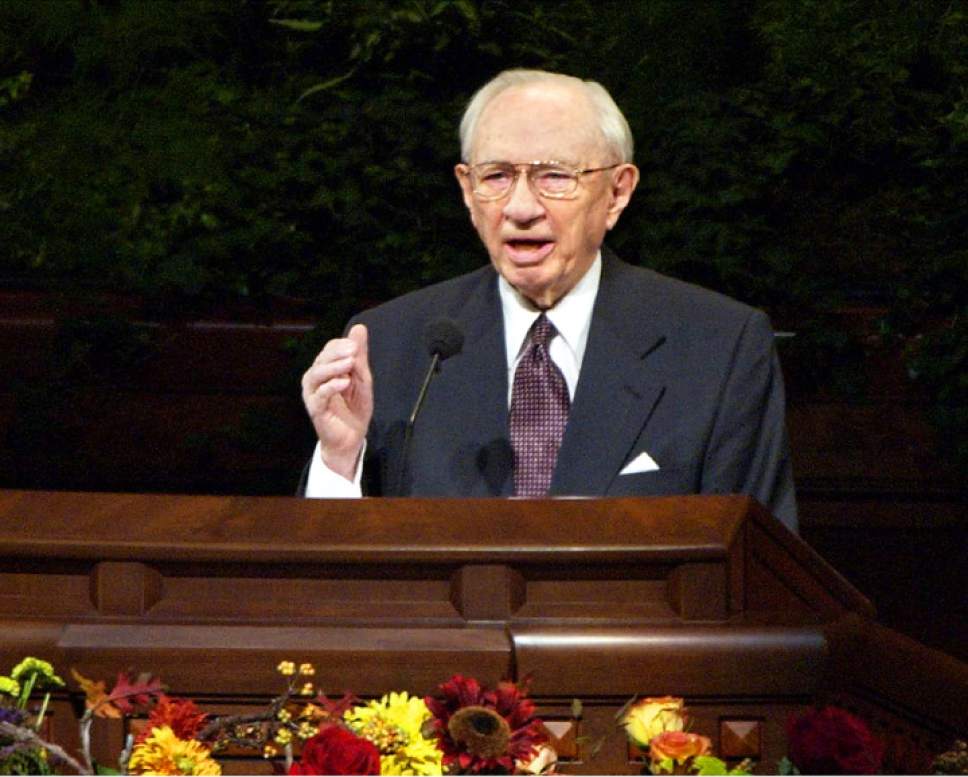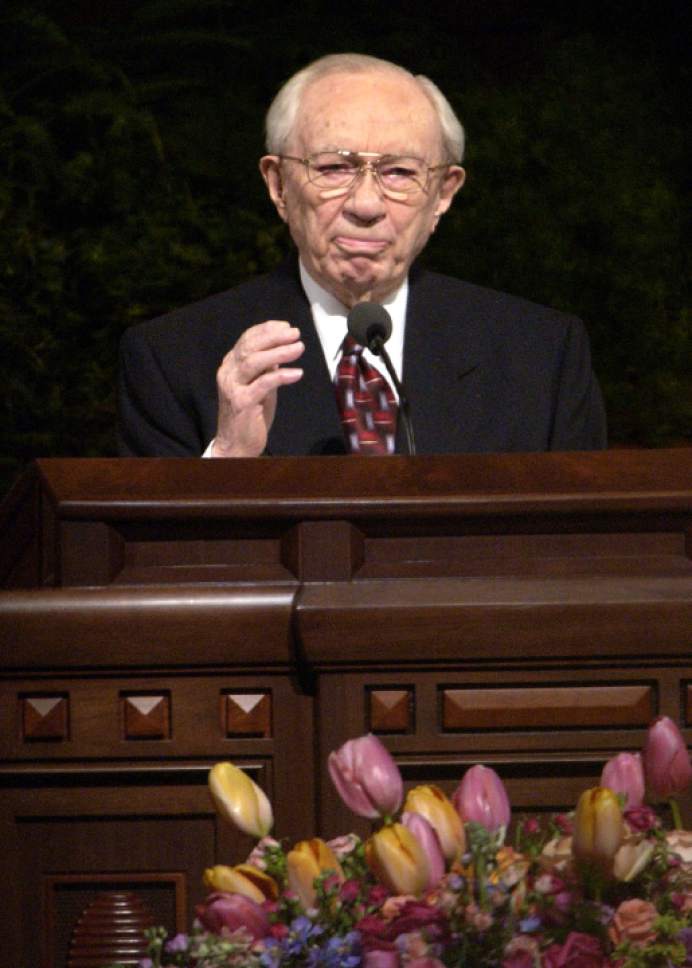This is an archived article that was published on sltrib.com in 2016, and information in the article may be outdated. It is provided only for personal research purposes and may not be reprinted.
On the eve of the first U.S.-led assault against Iraq in 1990, Nathan McCluskey, a lifelong Mormon from New Zealand, found himself sharing a room with an American Latter-day Saint who was cheering — even championing — that military action.
The Kiwi was appalled.
At the time, McCluskey was serving a two-year Mormon mission in Australia. His missionary companion, from Ephraim, had a brother in the U.S. Air Force and had hung an American flag in the pair's bedroom.
Every morning, the Utah-born "elder" — as male Mormon missionaries are known — crooned along with "I'm Proud to Be an American" as it played on his tape deck after which he would salute the Stars and Stripes.
Trouble is, McCluskey explained in a speech this summer, the Yank's three "flat mates" were all Kiwis. And, though they shared a common faith with their American compatriot, the New Zealanders had a profoundly different view of that war — and, indeed, war in general.
"We would match his singing with the New Zealand national anthem," McCluskey said, "and then a haka [dance] at the end."
It all proved unsettling — and still does today as Mormons across the globe spar over the virtues and vices of war.
—
Chapter and 'versus' • The Book of Mormon, the faith's unique scripture, "is full of war," McCluskey, an activist with a doctorate in political science, told a packed audience at the annual Sunstone Symposium this summer at the University of Utah. "An American rendering ... suggests that it teaches us to defend our families, freedom and religion with the use of military force, that we must guard against 'Gadianton-like' terrorism through unity of thought and leader support and that God will help us to win wars if we are Christian."
A standard Kiwi view of the Mormon text, however, would suggest "that pacifism is a greater manifestation of faith than militarism, that where war is encountered it should be defensive and never aggressive," he said, "and that temporal inequality in society leads to its ultimate demise."
It's almost like Latter-day Saints "on opposite sides of the Pacific are reading completely different holy books," McCluskey said. "One group sees it as the manifesto created by a twisted political alliance between Donald Rumsfeld, Kim Jong-il and Pope Urban II while the other sees it as the combined wisdom of Mahatma Gandhi, Senator Robert Byrd and Karl Marx."
McCluskey, who lives in Christchurch, long has recognized such tensions between the two cultures.
"I grew up in an American church in New Zealand," he recalled. "I inherently understood [potential converts'] reservations toward it."
When then-Prime Minister David Lange opposed nuclear weapons, Kiwi Mormons supported that position, McCluskey said, "because it fit with our understanding of the gospel."
Then came LDS Church President Gordon B. Hinckley's advice at Mormon General Conference in the aftermath of the attacks on the Twin Towers in 2001 to support both the U.S. president and his invasions of foreign sovereign states.
"I have just been handed a note that says that a U.S. missile attack is under way," Hinckley, who died in 2008, told the assembled members in Salt Lake City and millions more watching worldwide. "Those of us who are American citizens stand solidly with the president of our nation. The terrible forces of evil must be confronted and held accountable for their actions."
Despite the late president's caveat that the clash was "not a matter of Christian against Muslim" and his plea that members be "friendly and helpful, protective and supportive" of their Islamic neighbors — along with his assurance that Mormons are "people of peace," Hinckley's support of the U.S. strike in Afghanistan left McCluskey feeling "sick in my stomach," the New Zealander told his Utah audience, "as I confronted for the first time I could recall the possibility that, in my lifetime, living prophets, while living, may not be prophets."
—
Culture clash • Two years later, Hinckley softened his stance by acknowledging that members of the global faith could find themselves on both sides of a great debate about the U.S.-led invasion of Iraq.
"We are now a world church with members in most of the nations which have argued this matter," Hinckley noted in 2003. " ... But as citizens we are all under the direction of our respective national leaders."
McCluskey observed this divide firsthand, he said, when he and his wife, Gina Colvin, were teaching English in Taiwan, working alongside Mormons from the U.S. and New Zealand.
"There was a stark contrast between the Kiwis' understanding of the motivation for what we saw as an illicit and un-Christian war," he said, "and the viewpoint of the Americans we shared pews with on Sunday."
These differences "created tension in our wee English-speaking branch as we vented our frustration at the ignorance of our BYU graduate colleagues," he recalled in his address, "and their incredulity at our unwillingness to support the cause for 'freedom.' "
While visiting, or "home teaching," a Mormon couple from the U.S., McCluskey casually shared his view that "anyone who supports the invasion of Iraq is not worthy to partake of the sacrament."
Though the couple didn't say much in response, they did report him to the lay leader of their LDS congregation. On the following Sunday, that branch president urged him to stick to the prescribed discussion.
"It irked me," McCluskey acknowledged. "Questions flooded my mind. How is it that you can be put on [church] probation for masturbation or reading a copy of Penthouse magazine, but not for supporting the slaughter of innocent people in order to secure access to their natural resources?"
A bigger quandary then arose in this mind: "Am I more Kiwi than Christian or are they more American than Christian?"
The "clash of our culturally colored religious expressions," he said, "had called into question my very understanding of Christianity."
—
'Fiendish butchery' • Top leaders in The Church of Jesus Christ of Latter-day Saints have not always endorsed U.S. wars, McCluskey said.
In 1852, John Taylor, then a Mormon apostle and a future church president, the New Zealander said, "decried war as a manifestation that the devil has a hold over the hearts of the children of men and that nothing could be further from the desires of a saint."
Almost a century later, another apostle, J. Reuben Clark Jr., said that the worst aspect of dropping atomic bombs on Japan was not "that not only did the people of the United States not rise up in protest against this savagery, not only did it not shock us to read of this wholesale destruction of men, women, and children, and cripples, but that it actually drew from the nation at large a general approval of this fiendish butchery."
Americans are "deliberately searching out and developing the most savage, murderous means of exterminating people's that Satan can plant in our minds," Clark, who went on to serve in the governing LDS First Presidency, added. "We do it not only shamelessly, but with a boast. God will not forgive us for this."
These attitudes slowly evolved into greater Mormon acceptance of the country's military actions, no matter their basis.
McCluskey blames the reversal in rhetoric on a new generation of LDS leaders — including current church President Thomas S. Monson and the late apostles Boyd K. Packer and L. Tom Perry — who had served in the military during wartime.
"Not only did these men frequently share war stories in General Conferences," he said, "they normalized and even popularized militarism, and always from a U.S. perspective."
McCluskey argues that has undermined the 15.6 million-member faith's moral authority.
"Until Mormonism abandons its 50-year penchant for American cultural imperialism," particularly its defense of this country's militarism, concluded McCluskey, who serves as his LDS congregation's mission leader, it won't matter "how much the church lowers the missionary age, it won't be an attractive product to truth seekers."
After all, he said, "Christ is the prince of peace, not war."
Twitter: @religiongal





